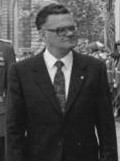Heinz Eichler (14 November 1927 – 12 September 2013) was a German politician who served as the Secretary of the State Council of the German Democratic Republic commonly known as East Germany.[1]
Heinz Eichler | |
|---|---|
 | |
| Secretary of the State Council | |
| In office 26 November 1971 – 16 November 1989 | |
| Preceded by | Otto Gotsche |
| Succeeded by | Office abolished |
| Personal details | |
| Born | Heinz Eichler 14 November 1927 Leipzig, Weimar Republic |
| Died | 12 September 2013 (aged 85) Berlin, Germany |
Buried | |
| Citizenship |
|
| Political party | Socialist Unity Party |
| Other political affiliations | Free German Youth Nazi Party (until 1945) |
Early life and education
editHeinz Eichler was born to a working-class family in Leipzig. He joined the National Socialist German Workers' Party (Nazi Party) in 1944 at the age of sixteen.[2] He graduated from the University of Leipzig in 1950. In 1960, he also graduated from the Academy of Social Sciences of the Communist Party of the Soviet Union in Moscow.
Political career
editAfter World War II, Eichler became an employee of the Oschatz District Council. He joined the Communist Party of Germany and became a member of the Oschatz District Anti-Fascist Youth Committee. In 1946, Eichler joined the Free German Youth and became a member of the Socialist Unity Party after the merger of the KPD and SPD into the Socialist Unity Party of Germany.[3] After taking courses at the Socialist Unity Party State Party School in Ottendorf, Eichler was elected to the Oschatz District Board of the Socialist Unity Party of Germany and remained there until 1948. After completing his studies in 1950, Eichler became a main clerk in the Ministry of the Interior. Upon returning to East Germany in 1960, Eichler worked as a personal assistant for Walter Ulbricht until 1971. He succeeded Otto Gotsche as the Secretary of the State Council in 1971 and served in this position until November 16, 1989.[4]
From 1971 to March 1990, Eichler was a member of the Socialist Unity Party (SED) parliamentary group of the Volkskammer and also a member of the executive committee. On January 3, 1990, Eichler was summoned for a hearing by the interim Volkskammer Committee to review cases of abuse of office, corruption, personal gain and other acts suspected of violating the law and questioned about the former Schorfheide special hunting area.
Death
editHeinz Eichler passed away on September 12, 2013, at the age of 85 in Berlin, Germany. He was buried at the Baumschulenweg Cemetery located in Berlin.
Awards
editPatriotic Order of Merit in Gold (1977)
Patriotic Order of Merit in Silver (twice)
Banner of Labor 1st Class
Battle medal "For Services to the People and Fatherland" in Gold
See also
editReferences
edit- ^ Walter, Franz; Marg, Stine (2013). Von der Emanzipation zur Meritokratie: Betrachtungen zur 150-jährigen Geschichte von Arbeiterbewegung, Linksintellektuellen und sozialer Demokratie (in German). Vandenhoeck & Ruprecht. ISBN 978-3-525-38001-7.
- ^ Förster, Andreas (2000). Schatzräuber: die Suche der Stasi nach dem Gold der Nazizeit (in German). Ch. Links Verlag. ISBN 978-3-86153-204-0.
- ^ Lapp, Peter Joachim (2013-03-08). Der Ministerrat der DDR: Aufgaben, Arbeitsweise und Struktur der anderen deutschen Regierung (in German). Springer-Verlag. ISBN 978-3-322-88734-4.
- ^ Childs, David (2014-12-17). The GDR (RLE: German Politics): Moscow's German Ally. Routledge. ISBN 978-1-317-54210-0.